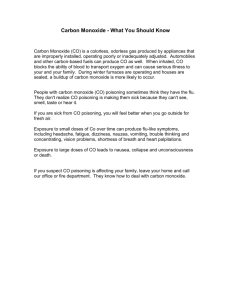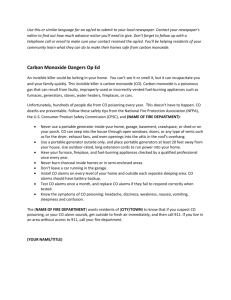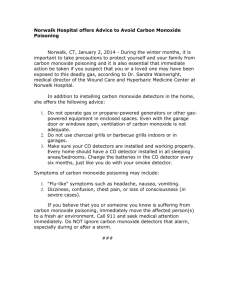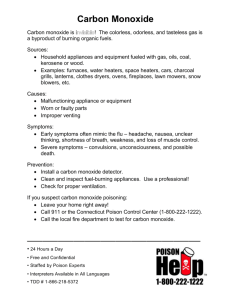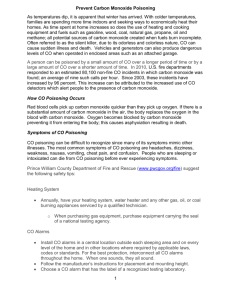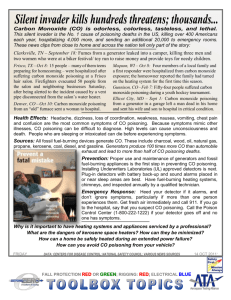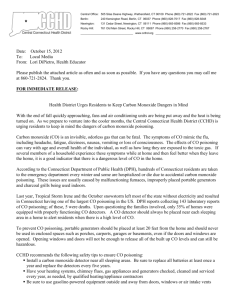Winter Weather Dangers
advertisement
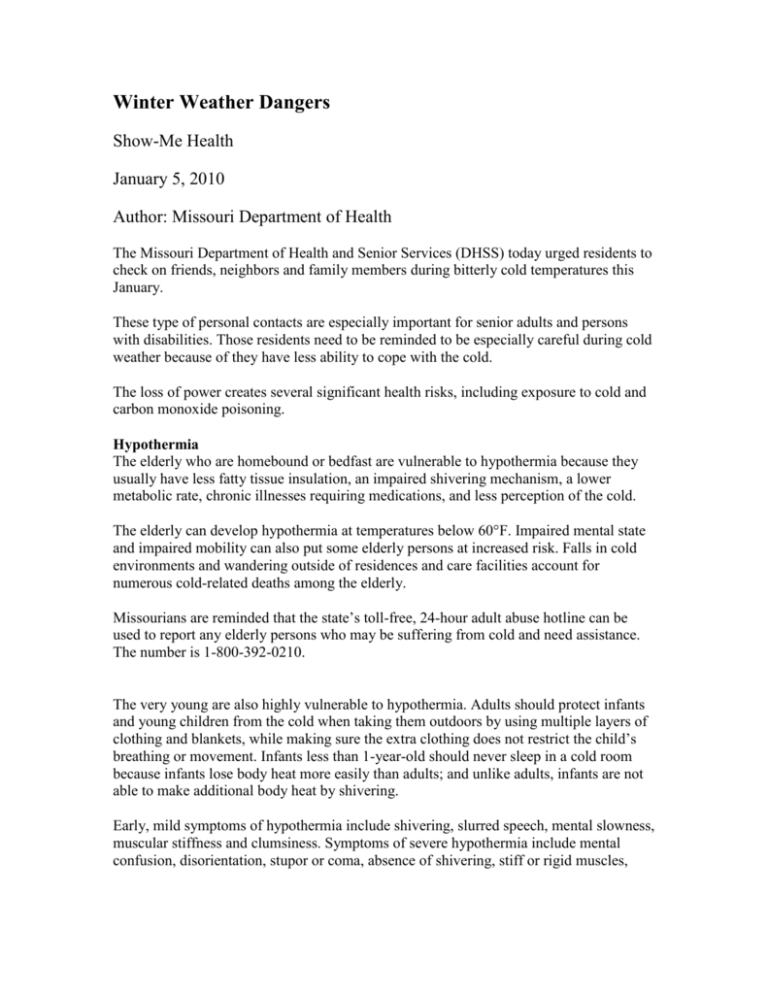
Winter Weather Dangers Show-Me Health January 5, 2010 Author: Missouri Department of Health The Missouri Department of Health and Senior Services (DHSS) today urged residents to check on friends, neighbors and family members during bitterly cold temperatures this January. These type of personal contacts are especially important for senior adults and persons with disabilities. Those residents need to be reminded to be especially careful during cold weather because of they have less ability to cope with the cold. The loss of power creates several significant health risks, including exposure to cold and carbon monoxide poisoning. Hypothermia The elderly who are homebound or bedfast are vulnerable to hypothermia because they usually have less fatty tissue insulation, an impaired shivering mechanism, a lower metabolic rate, chronic illnesses requiring medications, and less perception of the cold. The elderly can develop hypothermia at temperatures below 60°F. Impaired mental state and impaired mobility can also put some elderly persons at increased risk. Falls in cold environments and wandering outside of residences and care facilities account for numerous cold-related deaths among the elderly. Missourians are reminded that the state’s toll-free, 24-hour adult abuse hotline can be used to report any elderly persons who may be suffering from cold and need assistance. The number is 1-800-392-0210. The very young are also highly vulnerable to hypothermia. Adults should protect infants and young children from the cold when taking them outdoors by using multiple layers of clothing and blankets, while making sure the extra clothing does not restrict the child’s breathing or movement. Infants less than 1-year-old should never sleep in a cold room because infants lose body heat more easily than adults; and unlike adults, infants are not able to make additional body heat by shivering. Early, mild symptoms of hypothermia include shivering, slurred speech, mental slowness, muscular stiffness and clumsiness. Symptoms of severe hypothermia include mental confusion, disorientation, stupor or coma, absence of shivering, stiff or rigid muscles, shallow and very slow breathing, weak pulse, and a fall in blood pressure. If symptoms of hypothermia are detected, especially in an elderly person, seek immediate medical help. The health center maintains a Mitten Tree, with the help of donations from the community, to provide winter gear like gloves, scarves and hats to those who can’t afford to purchase these items. If you are in need, or know someone else who doesn’t have these protective items, send them to our office. There are no forms to fill out, you just pick what you need from the tree. Carbon Monoxide Poisoning Another winter hazard is carbon monoxide poisoning, which can injure the brain and the heart, resulting in permanent damage or death. Carbon monoxide poisoning can occur with the use of gas or kerosene heaters. It can also occur with indoor use of charcoal briquettes for the purpose of either home heating or cooking, or when gasoline-fueled generators are used indoors. Residents should ensure that natural gas, LP gas, or kerosene space heaters are installed and operated in accordance with the manufacturer’s instructions. DO NOT use gasoline or diesel-powered generators inside your home. Generators should be used only outdoors where there is adequate ventilation. DO NOT operate other unvented fuel-burning appliances in any room with closed doors or windows or in any room where people are sleeping. DO NOT burn charcoal or use gas grills inside your home. DO NOT use portable fuel-burning camping equipment indoors. DO NOT use gas appliances such as ranges, ovens or clothes dryers for heating your home. KNOW the symptoms of carbon monoxide poisoning. All gasoline and diesel generators create carbon monoxide, a colorless, odorless, tasteless gas that inhibits the body’s ability to absorb oxygen, a condition that can cause serious health problems, and even death, within a matter of minutes. The first symptoms of carbon monoxide poisoning usually include headache, lightheadedness, dizziness and unexplained sleepiness. Individuals should not wait for these signs, however, since at higher concentrations these symptoms may not occur, or may occur so rapidly that the victim does not have enough time to react. Other symptoms of exposure may include an inability to concentrate, memory loss, hallucinations and loss of coordination. Chest pain, irregular heartbeat and heart attack are also possible. Infants, the elderly, smokers, and individuals with heart disease are at special risk of carbon monoxide poisoning. In the event that you experience these symptoms, immediately leave the area where any such devices are located and seek medical attention or call 9-1-1. All services of the Livingston County Health Center are provided on a nondiscriminatory basis.
